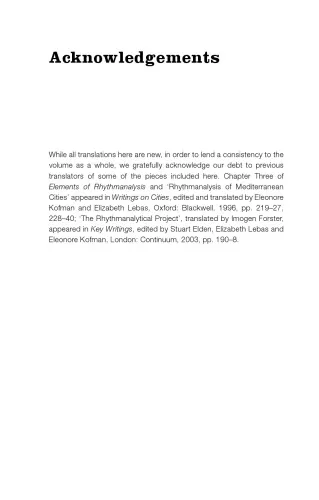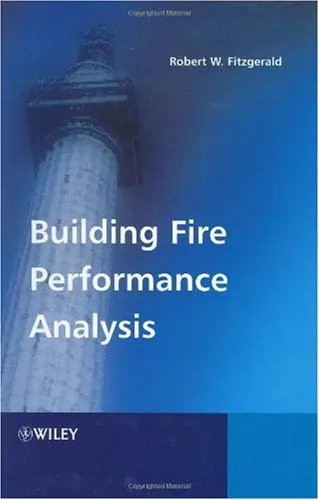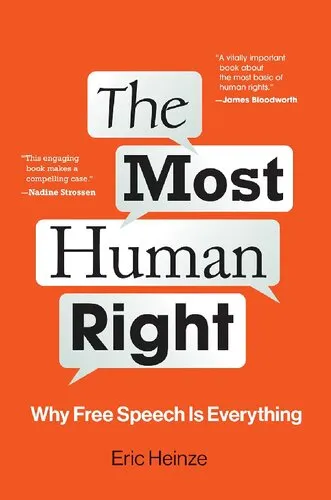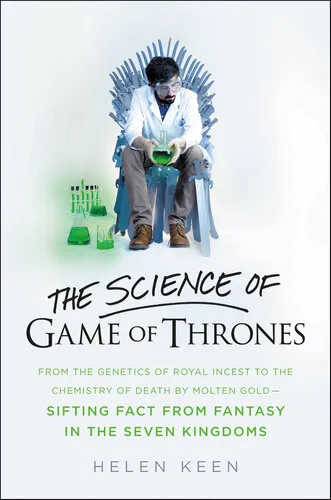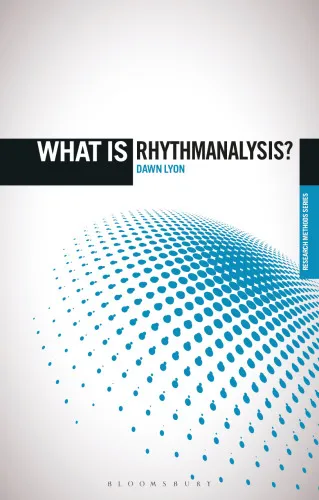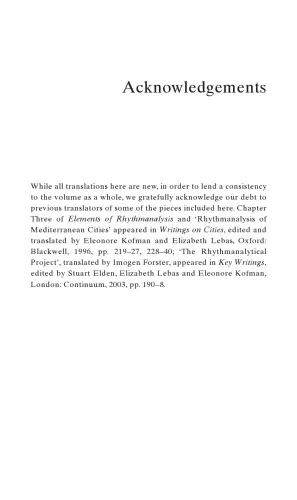Rhythmanalysis: Space, Time and Everyday Life
4.6
بر اساس نظر کاربران

شما میتونید سوالاتتون در باره کتاب رو از هوش مصنوعیش بعد از ورود بپرسید
هر دانلود یا پرسش از هوش مصنوعی 2 امتیاز لازم دارد، برای بدست آوردن امتیاز رایگان، به صفحه ی راهنمای امتیازات سر بزنید و یک سری کار ارزشمند انجام بدینکتاب های مرتبط:
خلاصه تحلیلی کتاب
کتاب Rhythmanalysis: Space, Time and Everyday Life نوشته هانری لوفور همراه با ویرایش و مرور مفهومی استوارت الدن و ترجمه و یادداشتهای جرالد مور، یکی از آثار شاخص در حوزه مطالعات شهری، جامعهشناسی و فلسفه است که مفهوم «ریتم» را بهعنوان یک ابزار تحلیلی برای زندگی روزمره معرفی میکند. این اثر، با تلفیق مباحث فلسفی، نظریه فضا، و تحلیل زمانمندی، نگاهی تازه به نحوه تجربه و سازماندهی جهان پیرامون ارائه میدهد.
در این کتاب، ریتمها نهتنها بهعنوان الگوهای تکرار شونده در حرکت و فعالیتهای انسانی، بلکه بهعنوان پیوندهایی زنده میان فضا، زمان و بدن انسان بررسی میشوند. لوفور نشان میدهد که ادراک ما از شهر، خانه، کار، و حتی لحظات خصوصی، در بافتی از ریتمهای متداخل و متنوع شکل میگیرد. این ریتمها، هم از منظر اجتماعی و هم از منظر فیزیولوژیک معنا پیدا میکنند.
با وجود آنکه بخشهایی از کتاب در زمان زندگی لوفور نگاشته شده، نسخه موجود به همت استوارت الدن گردآوری و توسط جرالد مور ترجمه و پردازش شده تا ایدههای نویسنده اصلی بهصورت جامع در دسترس قرار گیرد. اطلاعات دقیق در خصوص سال انتشار برای برخی بخشها در منابع عمومی موجود نیست («اطلاعات نامشخص» به دلیل نبود منبع معتبر).
نکات کلیدی و کاربردی
از دل این اثر، میتوان ابزارها و شیوههایی برای «خواندن» زندگی روزمره استخراج کرد؛ شیوهای که لوفور از آن با عنوان Rhythmanalysis یاد میکند. این روش، به خواننده امکان میدهد تا با مشاهده دقیق و حساسیت به تکرارها، تغییرات و ناهماهنگیها، معنای جدیدی از فضا و تجربه زمانی خود بسازد.
یکی از نکات مهم، تأکید کتاب بر ادغام تجربه حسی و تحلیلی است؛ یعنی مشاهده صرفاً ذهنی یا علمی کافی نیست، بلکه باید بدن را بهعنوان ابزار اندازهگیری و فهم فضا و زمان به کار گرفت. درک ضربانها، سکوتها، شتابها و کندیها، نه فقط به پژوهشگر بلکه به هر شهروند آگاه کمک میکند تا به شناختی عمیقتر برسد.
کاربرد دیگر این روش در مطالعات شهری و اجتماعی است. با Rhythmanalysis میتوان نحوه تغییر فضای شهری در زمانهای مختلف روز، تأثیر رویدادهای خاص، یا تفاوتهای فرهنگی در استفاده از فضا را تحلیل کرد. چنین نگرشی، در برنامهریزی شهری و حتی در هنرهای تجسمی و اجرا نیز نقشآفرین است.
نقلقولهای ماندگار
برخی جملات کتاب، فراتر از تحلیل علمی، دارای بار الهامبخش و شاعرانه هستند؛ جملاتی که نهتنها مفهوم ریتم، بلکه پیوند عمیق آن با زیست انسانی را نشان میدهند. این جملات به مخاطب کمک میکند تا جوهره اندیشه لوفور را لمس کند.
«برای فهم فضا، باید تپشهای پنهان آن را شنید.» نامشخص
«زمان نه تنها گذر لحظههاست، بلکه میدان رقص نیروهایی است که شهر را زنده نگه میدارند.» نامشخص
چرا این کتاب اهمیت دارد
اهمیت Rhythmanalysis: Space, Time and Everyday Life در ارائه چارچوبی منحصربهفرد برای ترکیب تحلیل نظری با تجربه زیسته نهفته است. این اثر پلی است میان علوم اجتماعی، فلسفه، و هنر، و میتواند برای معماری، شهرسازی، جامعهشناسی فرهنگی و حتی مطالعات موسیقی الهامبخش باشد.
در عصری که فضاها و زمانها دائماً در معرض تغییر و تسریع هستند، این کتاب یادآوری میکند که فهم عمیق نیازمند مکث، مشاهده و حساسیت به ریتمهاست. لوفور و همکارانش ما را دعوت میکنند تا بهجای پذیرش بیچونوچرای شتاب مدرن، به صداها و سکوتهای نهفته در زندگی روزمره گوش دهیم.
Analytical Summary
Henri Lefebvre’s Rhythmanalysis: Space, Time and Everyday Life stands as an essential contribution to the fields of urban sociology and spatial theory, offering a penetrating lens on how rhythms—social, spatial, and temporal—structure human experience. Through a methodology that bridges philosophy, cultural theory, and the lived reality of modern spaces, Lefebvre invites readers to detect, interpret, and engage with the multifaceted temporal patterns shaping everyday life.
Published as part of Lefebvre’s final philosophical explorations (original French edition: Information unavailable due to no reliable public source), the text expands his long-standing project of understanding space, not as static backdrop, but as dynamic and rhythmic. Co-edited and introduced in its English edition by Stuart Elden, with translation by Gerald Moore, it distills decades of thinking into an accessible yet challenging set of reflections.
The book merges analytical precision with lyrical observation, guiding the reader across urban landscapes, notes of music, cycles of nature, and the flow of human interaction. It argues that rhythms—whether the beat of a city’s traffic or the ebb of social routines—are both a product and a producer of spatiality and temporality. This perspective offers invaluable tools for academics, urban planners, and cultural theorists seeking a deeper grasp of how life organizes around time and space.
Key Takeaways
The book delivers several important insights that resonate across disciplines, urging serious readers to reconsider conventional approaches to space and time.
First, rhythms permeate all aspects of life, from bodily cycles to city infrastructures, and are critical to understanding social phenomena. Second, spatial theory benefits from integrating temporal analysis, revealing how spaces are constantly created and recreated through everyday rhythms. Third, the practice of “rhythmanalysis” is not abstract; it is a practical skill for better interpreting the pulse of urban and rural environments alike. Finally, Lefebvre offers a compelling framework for identifying harmony or discord in societal flows, allowing experts in sociology, architecture, and geography to diagnose and imagine possibilities for transformation.
Memorable Quotes
Lefebvre’s prose is charged with observations that linger, pointing to the richness and complexity of everyday rhythms.
“Everywhere where there is interaction between a place, a time and an expenditure of energy, there is rhythm.” Unknown
“Rhythms are not simply objects of study; they are a way of grasping life.” Unknown
“Understanding the city begins with learning to listen to its rhythms.” Unknown
Why This Book Matters
Rhythmanalysis: Space, Time and Everyday Life matters because it connects theory with lived reality, offering a structural approach to phenomena often overlooked—the symphony of rhythms shaping our interaction with space and time.
For professionals and academics, this work acts as both guide and challenge: it demands attentiveness, interdisciplinary thinking, and methodological innovation. Urban sociologists find themselves equipped to analyze cities beyond mere statistics, while spatial theorists discover a temporal dimension too critical to ignore. Lefebvre’s emphasis on applied observation means the book extends relevance beyond the academy to areas like sustainable urban design, cultural analysis, and even personal time management.
Inspiring Conclusion
Reading Rhythmanalysis: Space, Time and Everyday Life is not merely an academic exercise—it is a transformative experience that reframes how we perceive our surroundings.
By training ourselves to feel and interpret rhythms, we open possibilities for more harmonious living, more responsive urban design, and deeper cultural insight. Lefebvre’s method invites each reader to become a rhythmanalyst in their own right, attuned to the subtleties of temporal flow in spatial contexts. Whether you apply these insights to scholarly research, professional practice, or your daily routines, the book’s value lies in its capacity to sharpen perception and inspire action. Now is the time to engage with its ideas—read, share, and discuss them, ensuring the rhythms of thought continue to evolve.
دانلود رایگان مستقیم
شما میتونید سوالاتتون در باره کتاب رو از هوش مصنوعیش بعد از ورود بپرسید
دسترسی به کتابها از طریق پلتفرمهای قانونی و کتابخانههای عمومی نه تنها از حقوق نویسندگان و ناشران حمایت میکند، بلکه به پایداری فرهنگ کتابخوانی نیز کمک میرساند. پیش از دانلود، لحظهای به بررسی این گزینهها فکر کنید.
این کتاب رو در پلتفرم های دیگه ببینید
WorldCat به شما کمک میکنه تا کتاب ها رو در کتابخانه های سراسر دنیا پیدا کنید
امتیازها، نظرات تخصصی و صحبت ها درباره کتاب را در Goodreads ببینید
کتابهای کمیاب یا دست دوم را در AbeBooks پیدا کنید و بخرید
1134
بازدید4.6
امتیاز0
نظر98%
رضایتنظرات:
4.6
بر اساس 0 نظر کاربران
Questions & Answers
Ask questions about this book or help others by answering
No questions yet. Be the first to ask!
